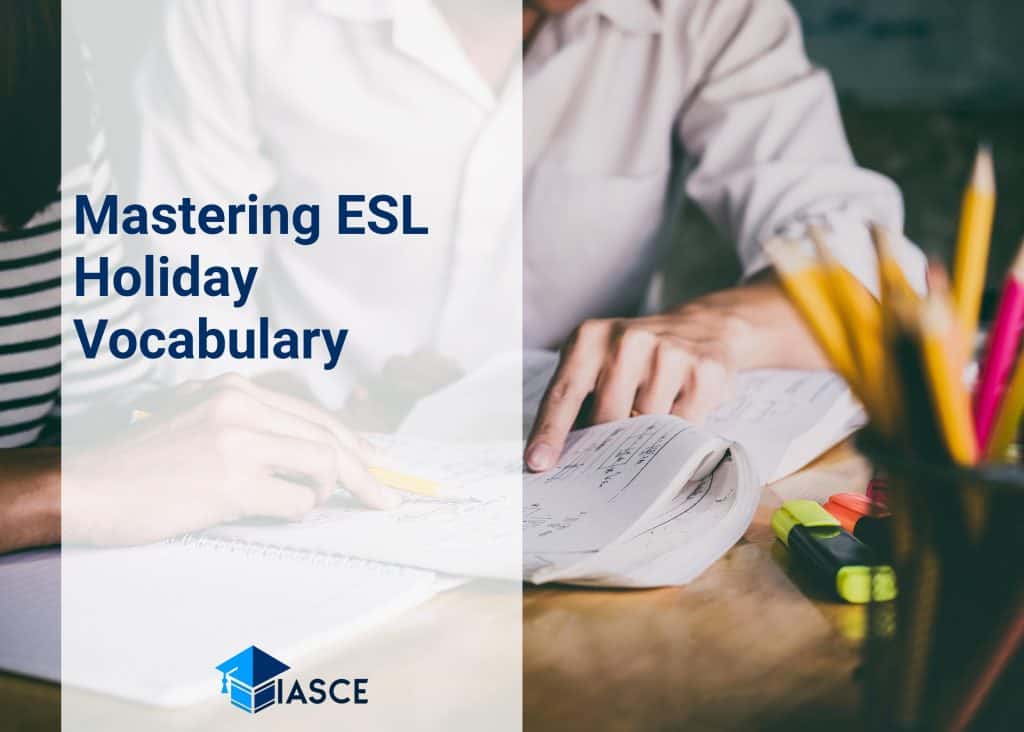Navigating the labyrinth of ESL holiday vocabulary can be a daunting task. Mastering this lexicon not only boosts your language skills but also enriches your cultural understanding, enabling you to immerse yourself fully in English-speaking festivities. I’m here to guide you through this process, breaking down complex terms into simple explanations.
As an ESL learner myself, I know it’s essential to tackle one word at a time. So we’ll start with the basics and gradually work our way up to more advanced holiday jargon. From “mistletoe” to “resolutions”, we’re going to explore it all!
Remember, language learning is a journey, and every new word you learn is a milestone achieved. So let’s dive into this comprehensive guide on mastering ESL holiday vocabulary and illuminate our path towards linguistic proficiency!
Understanding ESL Holiday Vocabulary
Ever wondered how to master holiday vocabulary while learning English as a second language (ESL)? I’m here to help! It’s crucial for all learners, beginners or advanced, to grasp the essence of holiday-related terms. This knowledge not only enriches your linguistic arsenal but also equips you with cultural nuances.
Common Holiday Phrases are a great place to start. We can’t overlook expressions like “Season’s Greetings”, “Happy Holidays”, and “Merry Christmas”. These phrases are used universally across English-speaking countries during the festive season. However, don’t forget that they vary based on regional traditions and customs.
Consider this:
|
Phrase |
Usage |
|---|---|
|
Season’s Greetings |
A warm wish suitable for all year-end holidays |
|
Merry Christmas |
An expression specifically for December 25th |
|
Happy New Year |
Celebratory greeting for January 1st |
Now let’s dive into Holiday Names. Each one has its unique vocabulary tied to it. For instance, words like “turkey” and “thankful” are often associated with Thanksgiving, while “eggs” and “bunny” go hand-in-hand with Easter.
Here are some examples:
-
Thanksgiving – Turkey, thankful
-
Halloween – Ghosts, costumes
-
Easter – Eggs, bunny
Remember that understanding these words in context is key to truly mastering them!
With the right approach and regular practice (think: flashcards or themed word games), you’ll find yourself more confident navigating conversations around these special days. Not only will this enhance your communication skills but it’ll also deepen your appreciation of English-speaking cultures. So grab your dictionary and let’s get started on expanding your ESL holiday vocabulary!
Effective Strategies for Mastering ESL Holiday Words
Let’s dive into the heart of English language learning – vocabulary. Holidays offer rich linguistic opportunities. I’ll share some effective strategies to help you master holiday-related words and phrases in English as a Second Language (ESL).
First off, contextual learning is crucial. Instead of memorizing words in isolation, try to learn them within the context of sentences or conversations related to holidays. For instance, it’s not just about knowing that “turkey” is a bird; it’s also recognizing its cultural significance during Thanksgiving.
Next up: practice! Consistent exposure to new terms can solidify your understanding over time. Engage with holiday-themed content like movies, songs, or books. This way, you’re not only picking up new words but also getting a feel for their usage.
To optimize retention, implement the spaced repetition system (SRS) in your study routine. It involves reviewing information at increasing intervals over time which helps move knowledge from short-term memory into long-term recall.
Here are three common holiday-related words and an example sentence for each:
|
Word |
Sentence |
|---|---|
|
Carols |
We sang Christmas carols all night long. |
|
Fireworks |
The New Year was celebrated with colorful fireworks. |
|
Costume |
My Halloween costume was a hit at the party! |
Don’t shy away from using digital resources either. There are numerous apps and websites available where you can play games and take quizzes focused on holiday vocabulary.
Also important: make use of mnemonic devices—imaginative ways to remember new terms by associating them with familiar images or sounds.
Lastly, don’t underestimate the power of speaking out loud when studying vocabularies—it aids pronunciation and reinforces memory.
Remember, mastering any language requires patience and determination; so stay curious, keep practicing regularly and before you know it—you’ll be comfortably chatting about holidays in English!
Conclusion: Taking Your ESL Holiday Vocabulary to the Next Level
So, you’ve made it this far in your English language journey. That’s something to celebrate! But let’s not stop here. It’s time to take your ESL holiday vocabulary up a notch.
Firstly, practice makes perfect. Try using these new words and phrases as much as possible during the holiday season. Write them down, say them out loud, use them in sentences; whatever method works best for you.
Secondly, don’t be afraid to expand beyond what we’ve covered here. The beauty of language is that it’s constantly evolving and there are always new words and phrases popping up – especially around holidays!
Lastly, remember that context is king when using these terms. Make sure you’re aware of where and how they’re typically used so you won’t find yourself in an awkward situation!
Here are some additional tips:
-
Read More: Find English books or articles about holidays and see how many of the words from our list you can spot.
-
Listen Carefully: Listen to English songs or watch movies themed around holidays.
-
Speak Up: Don’t shy away from conversations during holidays. Take part in discussions and try using the vocabulary learned.
By following these guidelines, I’m confident that you’ll master your ESL holiday vocabulary in no time!

